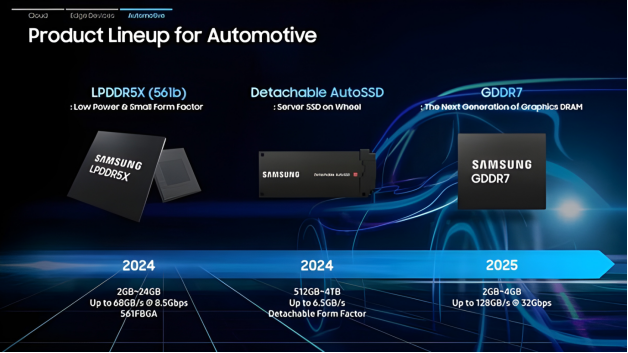
On November 27th, during the 2023 Investor Forum in Hong Kong, Samsung, a global technology leader, unveiled its strategic roadmap for entering the burgeoning automotive market. The company announced plans to release upgraded LPDDR5X memory chips and plug-and-play solid-state drives (SSDs) for automobiles in the coming year, positioning itself to dominate the evolving automotive storage landscape.

Recognizing the immense market potential driven by the rapid development of artificial intelligence in the automotive sector, Samsung disclosed that the current scale of the automotive system semiconductor market is estimated at $50 billion. Projections indicate a robust annual growth rate of 17% over the next five years (2023-2028), outpacing growth rates in the mobile (6%) and high-performance computing (12%) sectors. Samsung, leveraging its diverse product portfolio featuring cutting-edge computing chips and storage solutions, aims to capitalize on these opportunities and maintain a competitive edge.
Samsung's product release plan for the upcoming year includes an enhanced version of the LPDDR5X memory chip. This advanced memory chip boasts capacities ranging from 2GB to 24GB, achieving speeds of up to 68GB/s, with an 8.5Gbps per channel bandwidth and utilizing a 561FBGA packaging form.
Furthermore, Samsung is set to introduce plug-and-play automotive SSDs in the next year. These SSDs will focus on enhancing data efficiency by enabling storage virtualization, allowing a single SSD partition to serve multiple System-on-Chip (SoC) units. With capacities ranging from 512GB to 4TB and speeds of up to 6.5GB/s, these automotive-grade SSDs are poised to address the evolving needs of the automotive industry.
Looking ahead to 2025, Samsung's strategic roadmap includes the launch of the next generation of GDDR7 graphics memory chips. With capacities ranging from 2GB to 4GB, speeds reaching up to 128GB/s, and a per-channel bandwidth of 32Gbps, these graphics memory chips are designed to meet the demanding requirements of Level 4 autonomous driving, further solidifying Samsung's commitment to technological advancement in the automotive space.
Samsung is actively positioning itself to play a pivotal role in the transition to the next generation of technological capabilities. The company's overarching objective is to assert leadership in the autonomous driving industry by 2025, driven primarily by advancements in its memory and storage product portfolio.




